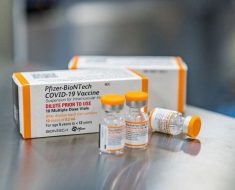
For patients with refractory ventricular fibrillation during out-of-hospital cardiac arrest, use of double sequential external defibrillation (DSED) or vector-change (VC) defibrillation results in better survival to hospital discharge compared with standard defibrillation, according to a study published online Nov. 6 in the New England Journal of Medicine to coincide with the American Heart Association Scientific Sessions 2022, held from Nov. 5 to 7 in Chicago.
Sheldon Cheskes, M.D., from the University of Toronto, and colleagues conducted a cluster-randomized trial among six Canadian paramedic services to assess DSED and VC defibrillation compared to standard defibrillation in adults with refractory ventricular fibrillation during out-of-hospital cardiac arrest. Data were included for 405 patients: 136, 144, and 125 were randomly assigned to receive standard defibrillation, VC defibrillation, and DSED, respectively. The data and safety monitoring board stopped the trial due to the coronavirus pandemic.
The researchers found that compared with the standard group, survival to hospital discharge was more common in the DSED and VC groups (30.4 and 21.7 percent, respectively, versus 13.3 percent; relative risks [95 percent confidence intervals], 2.21 [1.33 to 3.67] and 1.71 [1.01 to 2.88], respectively). A higher percentage of patients had a good neurologic outcome with DSED but not VC defibrillation compared with standard defibrillation (relative risks [95 percent confidence intervals], 2.21 [1.26 to 3.88] and 1.48 [0.81 to 2.71], respectively).
“Although the outcomes favored DSED, the logistics of having a second defibrillator available may be a challenge in some paramedic services,” the authors write.
One author disclosed financial ties to ZOLL Medical.
More information:
Sheldon Cheskes et al, Defibrillation Strategies for Refractory Ventricular Fibrillation, New England Journal of Medicine (2022). DOI: 10.1056/NEJMoa2207304
Comilla Sasson et al, Defibrillation after Cardiac Arrest—Is It Time to Change Practice?, New England Journal of Medicine (2022). DOI: 10.1056/NEJMe2213562
American Heart Association Scientific Sessions 2022
Journal information:
New England Journal of Medicine
Source: Read Full Article





